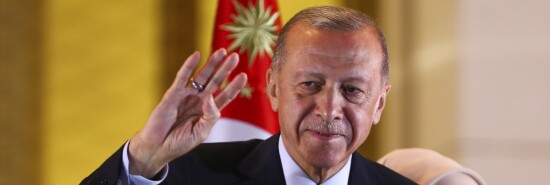
What Erdogan’s victory means for the US and its allies
Daniel DePetris
Video Embed
Say what you want about Turkish President Recep Tayyip Erdogan, but the man keeps winning elections. Last weekend, the Turkish president bested his challenger, Kemal Kilicdaroglu, in the second round of balloting by approximately 5 percentage points, Erdogan’s closest race in quite some time. With his latest victory, Erdogan retains his status as Turkey’s longest-serving head of state and continues his streak of consecutive wins at the polls — 11, to be exact.
As expected, Turkey watchers are now trying to discern what’s in store for Erdogan’s third decade in power. The general prognosis seems to be a continued tightening of his authoritarian grip. While the presidential elections were free and fair and boasted an extraordinarily high turnout, there is no disputing Erdogan’s strongman tactics. The political opposition viewed the election as perhaps the last chance to get Turkish democracy back on track after two decades in which Erdogan has snuffed out dissent, co-opted the Turkish media, and divided Turkish society to improve his electoral chances. There is no sign Erdogan is even remotely gracious in victory; he taunted his opponents during his victory speech.
BIDEN NEEDS TO SHELVE TAX INCREASES AND FOCUS ON SPENDING
In terms of Turkish foreign policy, it’s hard not to believe that the United States and Europe weren’t privately daydreaming about Erdogan’s defeat. The Turkish president is an intense nationalist with an independent streak, and his policy of maintaining balance between the West and Russia continues to be a source of consternation. Just because Turkey happens to be an old NATO ally doesn’t mean Turkish foreign policy will align with NATO’s 100% of the time. Turkey, after all, is in a unique geopolitical position, with its troubled economy tied to Europe’s but also increasingly reliant on Russian sources of energy.
The view of Erdogan as an inherently anti-Western nationalist is a strong one given his rhetoric, which can border on the conspiratorial (remember his protestations that Washington was a backer of the 2016 coup attempt against him?). In reality, however, Erdogan isn’t so much anti-Western as he is pro-Turkey. His policies will reflect what he believes serve the best interests of the Turkish state. Given that Erdogan is deeply committed to transforming Turkey into a power with global influence, his policies will often irritate those in Washington and Europe who think Erdogan should be a follower on the big issues that affect European security.
Even so, Erdogan can’t afford to alienate the West in its entirety. The Turkish economy is a dumpster fire: Inflation is above 40% (it reached 80% last fall), the lira has lost value to the dollar over the last year, and the country is trying to rebuild after a horrible earthquake even as it continues to host nearly 4 million Syrian refugees. Trade with the European Union represents approximately a quarter of Turkey’s entire GDP.
We are therefore likely to see a continuation of the foreign policy balancing act Erdogan has nearly perfected during his time in power. That means leveraging Turkish power to attain concrete concessions, preserving as many foreign relationships as he can to maximize Turkey’s flexibility, and throwing the West a bone on occasion to remind its NATO allies that it can still be useful.
For NATO, the immediate item in the inbox is Sweden’s accession, which Erdogan has held up for the better part of a year to push the Swedes into extraditing Kurdish people whom Turkey views as terrorists. With the right inducement, perhaps in the form of 20 or so F-16 fighter aircraft, Erdogan would be willing to lift his objections and allow the alliance to get on with it. President Joe Biden even hinted indirectly about such a trade during remarks over the weekend. Ultimately, allowing Sweden to join NATO is a pretty low-cost concession for the Turks, especially if the reward is to attain the fourth-generation aircraft they have long coveted.
Erdogan’s relationship with Russian President Vladimir Putin will continue as well. Just as Turkey can’t fully antagonize the U.S. and Europe, Turkey can’t fully antagonize Russia, either. Russia is a relatively cheap energy source at a time when Turkey’s economy could really catch a break. Ankara’s ties with Moscow serve a strategic function as well, allowing Turkey to boost its weight in international affairs by keeping the West honest and positioning Erdogan to be a valuable mediator on the biggest international story of the day: the war in Ukraine.
Erdogan enters his third decade in power newly resurgent after months of speculation about his political career ending in defeat. That risk has now passed, and the U.S. will have to learn to deal with it.
CLICK HERE TO READ MORE FROM THE WASHINGTON EXAMINER
Daniel DePetris (@DanDePetris) is a contributor to the Washington Examiner’s Beltway Confidential blog. His opinions are his own.
